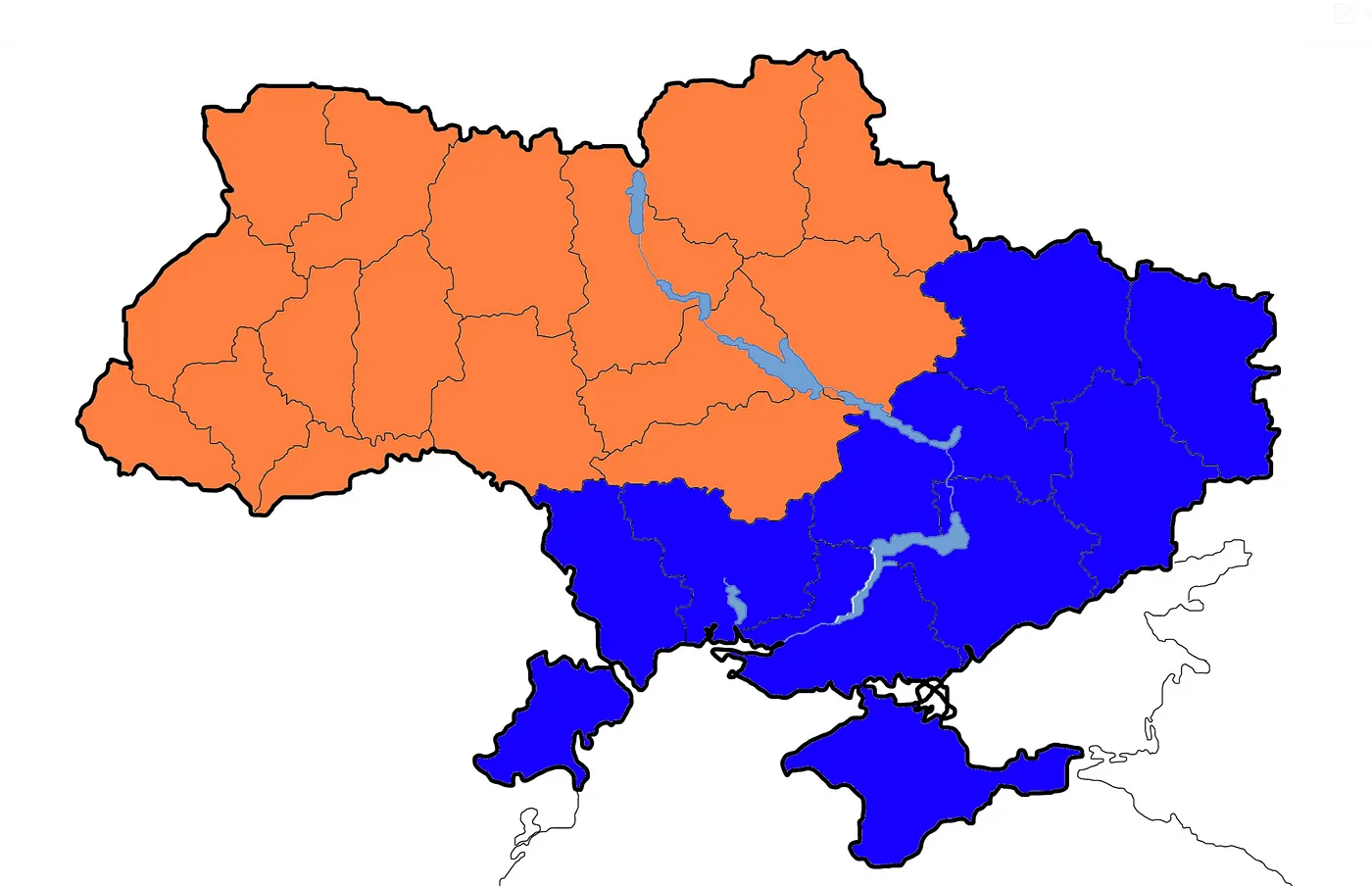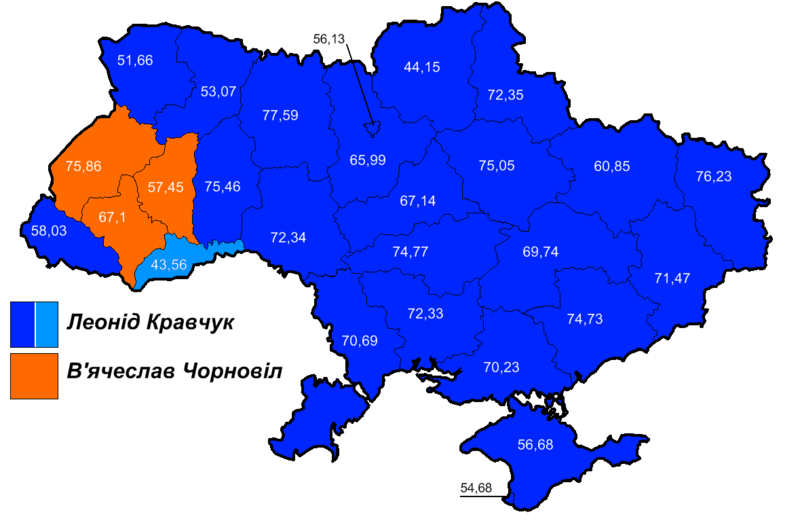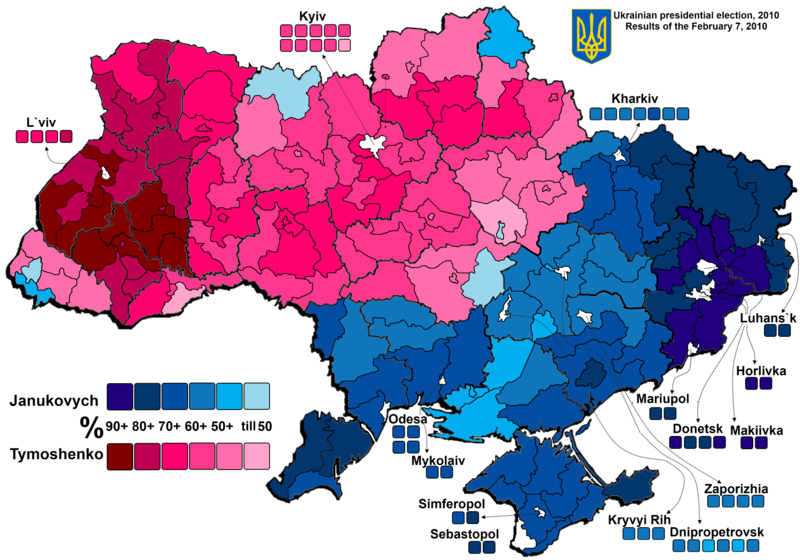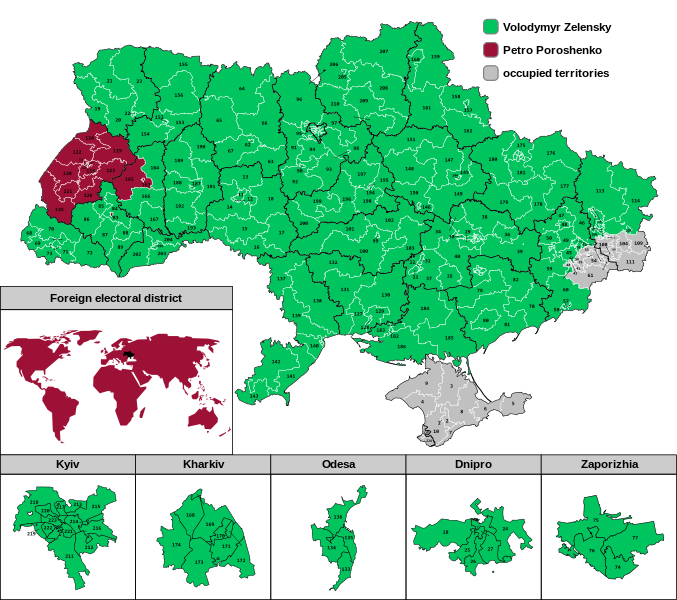Is Ukraine really divided into pro-European and pro-Russian?
The simplified narrative about Ukraine is like this: there is a pro-Western part of Ukraine and pro-Russian part of Ukraine and all people, presidents and politicians in Ukraine are divided into the two camps — pro-Western and pro-Russian. This is often accompanied by the picture similar to this:
 Typical division between West and East
Typical division between West and East
There is impenetrable wall between the two parts and they hate each other. But do they? Is the reality that simple?
As you might have already guessed — reality is not that simple. And I will not try to explain what is actually happening in Ukraine to the details, I will just show some facts, where this pro-Western/pro-Russian dichotomy fails miserably. And I will take the presidential elections as an example.
But first I will try to briefly explain what the pro-Western and pro-Russian usually mean in Ukraine. Pro-Western: support for Ukrainian language, most voters in Western Ukraine, anti-communist. Pro-Russian: support for Russian language, most voters in Eastern Ukraine, pro-communist. Also the pro-Western usually considered Russian influence as being a form of neo-colonialism and cultural politics was more important for them. While pro-Russian usually considered economics being more important than cultural politics and did not see Russia the same way. As for foreign policy — USA was rarely in the equation, it was mostly about choosing between Europe or Russia, since those are our neighbours.
1991 — Kravchuk vs Chornovil
 Chornovil in orange, Kravchuk in blue. Map by Vasyl` Babych
Chornovil in orange, Kravchuk in blue. Map by Vasyl` Babych
Chornovil was a very Ukrainian-oriented polititian, he was persecuted during the Soviet times for his views on Ukrainian independence. Kravchuk on the other hand was a member of Communist party. Kravchuk won. Technically he was pro-Russian — former communist, supported by East more than by West, gave away nuclear weapons to Russia. From the other side he spoke Ukrainian from start and he was the one who made the Ukraine actually independent.
1994 Kuchma vs Kravchuk
 Map by Vasyl` Babych
Map by Vasyl` Babych
In 1994 we see the division between East and West, but strangely enough now Kravchuk, who won the previous election and who was pro-Russian that time, was considered to be a pro-Western and Kuchma was a pro-Russian one. Kuchma did not even speak Ukrainian at first (he learned the language later). Kuchma, a clearly pro-Russian politician (according to voting patterns) won. However it’s during his first cadence the Ukrainian constitution was voted for. And it said that the only official language of Ukraine is Ukrainian. Wasn’t that a pro-Ukrainian move? But wait till the next elections.
1999 — Kuchma vs Symonenko
 Kuchma in blue, Symonenko in red. Map by Vasyl` Babych
Kuchma in blue, Symonenko in red. Map by Vasyl` Babych
Ok, so now we see that Kuchma, who won the previous election and was pro-Russian that time, is considered to be a pro-Western one (according to voting patterns) and he already speaks Ukrainian. Symonenko was a communist, and not a former one, so definitely pro-Russian. But the pattern breaks here. Two Donbas regions — Luhansk and Donetsk, vote differently (which rarely happens). West is definitely for Kuchma, even though West voted against him in previous elections. Kuchma won. During his second cadence in 2003 he almost started a war with Russia because of a Tuzla island conflict. Not a pro-Russian move, I must say.
2004 — Yushchenko vs Yanukovich
 Map by Steschke
Map by Steschke
This was an archetypal Ukrainian elections from the East/West dichotomy view. Yushchenko was clearly for the European path and for supporting Ukrainian culture. While Yanukovich was for closer ties with Russia and wanted Russian language to be the second official one. During these elections the Orange revolution happened. It was really peaceful — no clashes, no violence, no fires. Yushchenko won. By the way several Yanukovich supporters and members of his party wanted to create a Southern-Eastern Ukrainian Autonomous Republic after his loss, and even wanted to ask Putin for help, but Yanukovich stopped them from doing that, telling that he did not want any violence to happen. Wasn’t this a pro-Ukrainian move by him?
2010 — Yanukovich vs Tymoshenko
 Map by Vasyl` Babych
Map by Vasyl` Babych
Both of the candidates were prime-ministers during the Yushchenko presidency. Tymoshenko according to the voting patterns is pro-Western, while Yanukovich is pro-Russian (probably the only president who did not switch from being pro-Russian to pro-Western). However both of the candidates supported the European Union admission. Yanukovich won. Tymoshenko signed infamous Gas Agreements with Russia during the Yushchenko presidency, which were very unfavourable for Ukraine, which was a very anti-Ukrainian move (which is strange if to consider both Yushchenko and Tymoshenko being pro-Western). During Yanukovich she was put into the prison. So pro-Russian president put the pro-Western person into a prison because of the pro-Russian agreements signed by her. Aren’t you confused by now?
2014 — Poroshenko

During the 2014 elections, which happened after Euromaidan, Poroshenko did not have any real contestants. Maybe his strongest opponent was (a pro-European ?) Tymoshenko. The voting pattern broke from the previous two elections. His support was indeed higher on the West than on the East, but he won with a majority of votes everywhere. Was he pro-Russian or pro-Western? During his presidency he clearly showed himself as a pro-Western president.
2019 — Zelensky vs Poroshenko
 Map by Tohaomg
Map by Tohaomg
But then people around Ukraine, especially on the traditionally pro-Russian parts were dissatisfied with Poroshenko. And Zelensky won these heated elections. And according to voting patterns he should be considered to be a pro-Russian (he was still more supported on the East than on the West). And he was a Russian speaker. Or is he simply pro-Ukrainian? As most of other presidents before him were?
Conclusion
The pro-Russian vs pro-Western dichotomy is not that clear. Kravchuk, Kuchma, Poroshenko and Zelensky could be seen both pro-Western and pro-Russian depending on the point of view and time. Case with Yushchenko and Yanukovich is clearer, but even those were not that hard-core pro-Russian or pro-Western as usually portrayed (Tymoshenko case with Gas Agreements shows that). Everything is complicated.
Moreover — if one wants to believe in the East/West dichotomy, this is not true for at least the last 9 years and election patterns are clear about it. Ukraine was very united during last two elections. And still is.
Maps taken from Wikimedia:
https://commons.wikimedia.org/wiki/File:%D0%92%D0%B8%D0%B1%D0%BE%D1%80%D0%B8_1991-uk.png
https://commons.wikimedia.org/wiki/File:%D0%92%D0%B8%D0%B1%D0%BE%D1%80%D0%B8_1994.png
https://commons.wikimedia.org/wiki/File:%D0%94%D1%80%D1%83%D0%B3%D0%B8%D0%B9%D1%82%D1%83%D1%80_1999%D0%BF%D0%B5%D1%80%D0%B5%D0%BC%D0%BE%D0%B6%D1%86%D1%96%D0%B7%D0%B0%D0%BE%D0%B1%D0%BB%D0%B0%D1%81%D1%82%D1%8F%D0%BC%D0%B8%D0%B7%25.png
https://commons.wikimedia.org/wiki/File:Ukraine_einfach_Wahlen_3WG.png
https://commons.wikimedia.org/wiki/File:%D0%94%D1%80%D1%83%D0%B3%D0%B8%D0%B9%D1%82%D1%83%D1%80_2010%D0%BF%D0%BE_%D0%BE%D0%BA%D1%80%D1%83%D0%B3%D0%B0%D1%85-en.png
https://commons.wikimedia.org/wiki/File:%D0%92%D0%B8%D0%B1%D0%BE%D1%80%D0%B8%D0%9F%D0%A3_2014%D0%9B%D1%96%D0%B4%D0%B5%D1%80%D0%B8%D0%9E%D0%91%D0%9B%D0%86%D0%86%D0%86%D0%86%D0%86%D0%86.PNG
https://commons.wikimedia.org/wiki/File:%D0%A0%D0%B5%D0%B7%D1%83%D0%BB%D1%8C%D1%82%D0%B0%D1%82%D0%B8%D0%92%D0%B8%D0%B1%D0%BE%D1%80%D1%96%D0%B2%D0%9F%D1%80%D0%B5%D0%B7%D0%B8%D0%B4%D0%B5%D0%BD%D1%82%D0%B0%D0%A3%D0%BA%D1%80%D0%B0%D1%97%D0%BD%D0%B8_2019%D0%B7%D0%B0%D0%BE%D0%BA%D1%80%D1%83%D0%B3%D0%B0%D0%BC%D0%B8(%D0%B4%D1%80%D1%83%D0%B3%D0%B8%D0%B9_%D1%82%D1%83%D1%80).svg